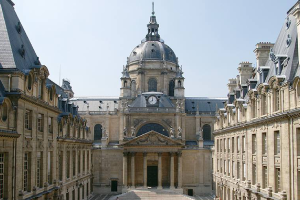21, rue de l'école de médecine, 75006 Paris, France
Career Counselling

Sorbonne University is a large research university located in Paris, France. With more than 55,000 students, it is one of the largest public French Universities. It has over 6,000 researchers and academic staff, and is a notable hub of innovation.
Academic and research activities at Sorbonne University are divided into three Faculties: Arts & Humanities, Science & Engineering, and Medicine. These Faculties are further divided into Schools, Departments, Research Units, and Institutes. Interdisciplinary research is a key focus area at the Univer...
| Establishment year | 1257 |
| Total Students | 55,300 |
| International Students | N/A |
| QS World University Rankings 2024 | 59 |
| Campus Size | N/A |
| Total Number of Campuses | 3 (Paris) 3 (Ile de France) 3 Observatories in other regions 1 International Branch (Abu Dhabi) |
| University Website | https://www.sorbonne-universite.fr/en |
| No. of Schools and Divisions | 3 Faculties (Arts and Humanities, Science and Engineering, Medicine) |
| Nobel Prize Winner Alumni | 5 (with Marie Curie winning 2 prizes) |
| No. of Education Programs | N/A |
| Student to Faculty ratio | 8.6:1 |
Sorbonne University offers undergraduate and postgraduate courses through 3 Faculties, which are further subdivided into Schools and Departments.
Admission requirements usually vary by Faculty; the individual webpages of the three main academic divisions of Sorbonne University have information about the minimum performance levels required for admission to both UG and PG programs. Applicants to Bachelor’s programs need a valid high school secondary degree from a recognised school, and Master’s applicants must have completed an undergraduate course in a related discipline. All candidates for admission must hold a valid international passport.
Most courses at the University are taught in French, including all Bachelor’s programs. Therefore, language proficiency is an important part of the eligibility criteria for international students. For the Faculties of Arts & Humanities and Science & Engineering, B2 Level Proficiency is usually sufficient, though certain courses may have different requirements. For courses in the Faculty of Medicine, C1 Level is usually mandated. The University provides language courses for applicants who meet the academic entry requirements but need additional training in French before they can join a full time course. These classes can also be taken during the regular semester, and a compulsory online test for international applicants determines the number and frequency of French language classes during the first year of study.
Applicants to Sorbonne University must complete the procedure before the end of April every year. Applications are submitted directly to the Faculty of interest, and not to the University International Office. Both undergraduate and postgraduate applicants must fill in the registration form online; the required documents (identification and academic certificates / transcripts) can either be scanned, authorised, and uploaded, or sent by post. The University usually takes a month to finalise decisions on each application.
At the time of registration, students must pay the Student and Campus Life Contribution (CVEC) fee of 95 Euros. This covers administrative costs related to the application process; it also funds various campus facilities and free health insurance for all students at Sorbonne University. The final step in the online registration process involves choosing individual courses, tutorials, and laboratory work schedules.
After receiving an offer of admission from Sorbonne University, international candidates must apply for a long stay student visa in France via the nearest French Embassy; this process can take from a few weeks to a few months, so it is recommended that the admission process be completed as soon as possible in the annual cycle.
Sorbonne University does not charge tuition fees, in keeping with the trend followed by many other French state universities. However, students must pay registration fees; these are used to cover administrative costs, whereas the Government covers the cost of teaching and research. The registration fees are less than 1,000 Euros per year for all degree programs at the University. The exact annual amounts are:
Sorbonne University maintains an online rental platform through which students can book three kinds of accommodation: student housing, shared flats, and private residences. The first of these are associated with the lowest rents, between 400 and 500 Euros per month. Private residences in Paris can cost up to 900 Euros per month. Other living costs include food, transport within the city, shopping for essential items, and entertainment. These add up to a few hundred Euros per month. Overall, accommodation and living costs come to approximately 10,000 Euros per year.

Sorbonne University has several historic and modern buildings. The Institute of Art and Archaeology is particularly noteworthy; it is classified as a historical monument by the Government. The Pierre and Marie Curie campus hosts many of the academic and research activities of the science and engineering faculty.
A unique feature of Sorbonne University is that its scientific departments have preserved collections that have been built up over centuries.
The facilities in the campuses of Sorbonne University are designed to be used by enthusiastic learners of all ages. In addition to the full time and part time students enrolled at the University, Sorbonne also runs summer programs for children and adults, and continuing education courses for business executives and first time adult learners.
Students and staff of Sorbonne University are very mindful about their role in the community. They strive to bring the benefits of science and medicine to the population at large. Initiatives like The Science House are a part of this trend, where high school teachers across Paris are invited to participate in training programs so that they can communicate the excitement of the latest advances in science and technology to their students.

There are 150 student associations active at Sorbonne University. These are financed partly by the University itself, and partly by the activities of the clubs (for example, paid performances that are open to members of the public). Student leaders act as the bridge between students and the management, with an overall Student Vice President, and three Vice Deans of the Faculties of Arts, Medicine, Science and Engineering.
Sorbonne University provides facilities for its students to play more than 50 different sports. These include individual and team sports for beginners and experts, intra-university and intercollegiate competitions for elite athletes, and training camps / courses for members of the University community who are keen to track their improvement. Sorbonne maintains an online sports portal through which students can discover athletic activities, join clubs, and sign up for sports leagues.
There are three different types of scholarships offered by Sorbonne University:
There are also several third parties that provide scholarships to international students at Sorbonne University. Most of these are country specific; for example, the JN Tata Endowment Loan Scholarship and the Lady Meherbai D Tata Education Trust provide financial assistance to Indian students enrolled in undergraduate and postgraduate programs at the University. Certain French companies also provide scholarships to students enrolled in specific Master’s degree programs.
